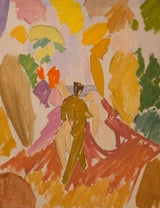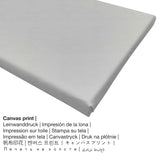Edvard Weie, 1941 - Faun and Nymph - fine art print
Tax included. Shipping calculated at checkout.
Original artwork information from the museum's website (© Copyright - Statens Museum for Kunst (National Gallery of Denmark) - Statens Museum for Kunst (National Gallery of Denmark))
Faun and Nymph is the latest and most famous of Weie’s large-scale compositions. The picture was created in the summer of 1941, the last of Weie’s active years as an artist. It marks the end of his lifelong work with mythological and literary motifs.
Faun and nymph united Weie got his subject matter from Paul Cézanne’s (1839-1906) painting The Abduction from 1867, but it also ties in with his own earlier mythological pictures where fauns and nymphs appear as the main characters. Here they are united: the faun, his back to us, carries his beloved, a nymph, towards the sea and the sky while she rests, yielding, in his arms.
Pure harmonies of colour The idea for the landscape with the road leading towards the sea comes from Weie’s own landscape Mindet, Christiansø from 1912. In this late picture, however, the landscape has been simplified. The green leaves of the tree have been depicted as an almost crystalline structure composed of stringently defined fields of colour. All lines lead to the couple in the middle, drawing them into the picture: from the earth to the sea and further on into the sky. The picture marks the culmination of Weie’s ambition to compose a picture consisting entirely of pure harmonies of colour, serving here as accompaniment to an ideal image of the world where man and woman are united, where matter becomes spirit.
Article summarization
The 20th century artpiece Faun and Nymph was made by Edvard Weie in 1941. The work of art can be viewed in in the Statens Museum for Kunst (National Gallery of Denmark)'s art collection in Copenhagen, Denmark. This modern art public domain work of art is included with courtesy of National Gallery of Denmark.Creditline of the artwork: . Furthermore, alignment is portrait and has a ratio of 3 : 4, which means that the length is 25% shorter than the width.
Get your favorite art print material
In the dropdown menu right next to the product offering you can pick your prefered size and material. We allow yout to choose among the following variants:
- Glossy acrylic glass print (with real glass coating on top): An print on acrylic glass, often named a UV print on plexiglass, will transform an artwork into brilliant wall decoration. The work of art is made with modern UV printing machines. This makes rich and sharp color shades. The major benefit of an acrylic glass fine art print is that contrasts and smaller artwork details become recognizeable due to the very fine gradation. The plexiglass with real glass coating protects your selected art print against light and external influences for many more years to come.
- Aluminium dibond print: An Aluminium Dibond print is a print with a true depth effect, which creates a contemporary impression throuch a non-reflective surface structure. A direct Direct Print on Aluminum Dibond is the best introduction to fine art replicas on aluminum. For your Print On Aluminum Dibond, we print your selected artpiece right onto the surface of the white-primed aluminum material. The bright and white parts of the artpiece shine with a silk gloss, however without any glare.
- Poster print (canvas material): The Artprinta poster print is a UV printed canvas paper with a slightly rough finish on the surface. It is used for placing your fine art print with a customized frame. Please keep in mind, that depending on the absolute size of the poster we add a white margin 2-6cm around the work of art, which facilitates the framing with your custom frame.
- The canvas print: A canvas print is a printed canvas stretched on a wood frame. The great advantage of canvas prints is that they are relatively low in weight, which means that it is quite simple to hang up your Canvas print without extra wall-mounts. That is why, canvas prints are suited for all types of walls.
Artist summary table
| Artist name: | Edvard Weie |
| Alternative names: | Weie Edvard, Edvard Weie, Weie Viggo Thorvald Edvard |
| Artist gender: | male |
| Artist nationality: | Danish |
| Jobs of the artist: | painter |
| Country of origin: | Denmark |
| Artist category: | modern artist |
| Died at the age of: | 64 years |
| Year of birth: | 1879 |
| Died in the year: | 1943 |
| Deceased in (place): | Copenhagen, Hovedstaden, Denmark |
Structured information on the piece of art
| Name of the artpiece: | "Faun and Nymph" |
| Classification: | painting |
| General category: | modern art |
| Century: | 20th century |
| Year of creation: | 1941 |
| Approximate age of artwork: | 70 years |
| Museum / collection: | Statens Museum for Kunst (National Gallery of Denmark) |
| Location of museum: | Copenhagen, Denmark |
| Available under: | www.smk.dk |
| License: | public domain |
| Courtesy of: | National Gallery of Denmark |
Structured item details
| Article type: | art copy |
| Reproduction method: | digital reproduction |
| Production method: | digital printing (UV direct print) |
| Product Origin: | German production |
| Type of stock: | on demand production |
| Intended product usage: | art collection (reproductions), art print gallery |
| Alignment of the artwork: | portrait alignment |
| Image ratio: | length to width 3 : 4 |
| Side ratio implication: | the length is 25% shorter than the width |
| Available variants: | poster print (canvas paper), metal print (aluminium dibond), acrylic glass print (with real glass coating), canvas print |
| Canvas on stretcher frame (canvas print) sizes: | 30x40cm - 12x16", 60x80cm - 24x31", 90x120cm - 35x47", 120x160cm - 47x63" |
| Acrylic glass print (with real glass coating) options: | 30x40cm - 12x16", 60x80cm - 24x31", 90x120cm - 35x47", 120x160cm - 47x63" |
| Poster print (canvas paper): | 30x40cm - 12x16", 60x80cm - 24x31", 90x120cm - 35x47" |
| Aluminium print: | 30x40cm - 12x16", 60x80cm - 24x31", 90x120cm - 35x47" |
| Art print framing: | not available |
Important information: We try all that we can to describe our art products as closely as possible and to showcase them visually in our shop. Nonetheless, the colors of the print materials and the printing can vary somehwat from the presentation on your device's monitor. Depending on your settings of your screen and the condition of the surface, not all color pigments are printed one hundret percent realistically. Considering that our art prints are processed and printed by hand, there might as well be minor differences in the exact position and the size of the motif.
This text is copyrighted ©, Artprinta (www.artprinta.com)














